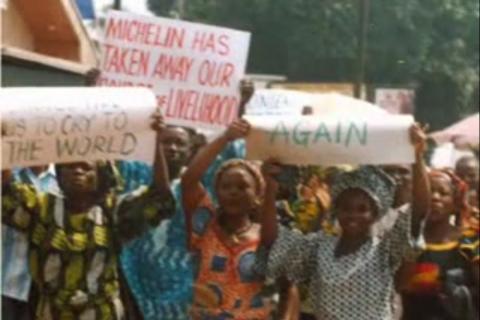In 1999, shortly after he was elected, President Hugo Chávez received a letter from WRM (seehttp://www.wrm.org.uy/bulletin/22/Venezuela2.html) in which we expressed our deep concern over the serious impacts on peasant communities in the state of Portuguesa generated by the monoculture tree plantations operated by Smurfit Cartón de Venezuela (a subsidiary of the Smurfit Kappa Group, a leading producer of cardboard for the European market)
Other information
April 17 has been declared by La Via Campesina the “International Day of Peasant’s Struggles” to commemorate the slaughter by the Brazilian police in 1996 of 19 peasants of the “landless” movement while they mobilized to get access to some land.
The land issue has becoming a major one in Brasil and the Movement of Landless Rural Workers MST have been very active.
If after reading the above articles you (as a woman within an organization, as a member of a women’s movement, as an activist on human rights issues, as an environmentalist, as a journalist, as a member of a consumer’s association, as a campaigner on climate issues, trade issues, health issues, etc) are wondering what you can do to start making changes to the current situation, we have some ideas that we hope may be of use.
WRM has a special section on Women, Forests and Plantations in its web site, which can be accessed at http://www.wrm.org.uy/subjects/women.html
In 1991, the Veracel Celulose company, then known as Verazcruz Florestal, first arrived in the extreme south region of the state of Bahia.
Originally, this hot, humid region was covered with various types of Atlantic Forest, which has since been destroyed and replaced with crops, pastureland and monoculture eucalyptus tree plantations.
Concern over the destruction of forests was already documented at the end of the seventeenth century. Since then, some studiesargued that it was necessary to develop knowledge regarding forest use adapted to the situation of tropical forests considering that the way it was being carried out –as well as the slavery-based approach- were destructive and degenerated national morale.
As exposed in previous WRM Bulletin issues, criminalization is part of a strategy aimed at silencing any protest generally against the extractive activities of transnational corporations (see WRM Bulletin Nº 125). It is happening all over Southern countries. And it is happening right now in Indonesia, where it has victimized another fighter of social resistance to land-grabbing by palm oil-companies in the country.
The Paraguayan Federation of Wood Industries (Federación Paraguaya de Madereros - FEPAMA) is talking of “collaborating with the Agrarian Reform Project promoted by the Government, through a proposal for comprehensive rural development and generation of wealth by introducing tree plantations on idle lands.” (1) FEPAMA alleges that “with this work special support could be provided to small and medium-sized rural landowners, to enable them to help organize the promotion of tree plantations ...
In Uruguay at the end of the forties, the State promoted an exemplary initiative, the creation of the National Settlement Institute (Instituto Nacional de Colonización - INC), that arose from the need for a “suitable instrument to promote a rational subdivision of land and its appropriate exploitation in order to achieve the settlement and welfare of rural workers, thus promoting an increase and improvement in farm production.”
Once more, the conflict over natural resources has played havoc on humble people. This time the criminal action took place on the settlement of Suluk Bongkal, Beringin, in the district of Bengkali, Riau Province, Sumatra.
This new publication of the WRM Series on Plantations (* ) examines resistances of populations neighboring two of Africa’s largest industrial tree plantations: the rubber monoculture Hévéa-Cameroun (HEVECAM) and the oil palm plantation Société Camerounaise de Palmeraies (SOCAPALM). The report intends to contribute to fill a lack of information on the situation around commercial plantations in Equatorial Africa.
Did you ever imagine that the tyres of your car may have been produced at the expense of a local community’s livelihood in Nigeria?
Most of the world natural rubber production goes for the manufacturing of tyres for different types of vehicles, ranging from cars, to trucks, airplanes and so on. To have an idea of the huge amount of tyres consumed, let’s take a look at the statistics in 2007 where 1.3 billion tires were produced.

